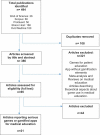A systematic review of serious games in medical education: quality of evidence and pedagogical strategy
- PMID: 29457760
- PMCID: PMC5827764
- DOI: 10.1080/10872981.2018.1438718
A systematic review of serious games in medical education: quality of evidence and pedagogical strategy
Abstract
Introduction: The literature shows an optimistic landscape for the effectiveness of games in medical education. Nevertheless, games are not considered mainstream material in medical teaching. Two research questions that arise are the following: What pedagogical strategies do developers use when creating games for medical education? And what is the quality of the evidence on the effectiveness of games?
Methods: A systematic review was made by a multi-disciplinary team of researchers following the Cochrane Collaboration Guidelines. We included peer-reviewed journal articles which described or assessed the use of serious games or gamified apps in medical education. We used the Medical Education Research Study Quality Instrument (MERSQI) to assess the quality of evidence in the use of games. We also evaluated the pedagogical perspectives of such articles.
Results: Even though game developers claim that games are useful pedagogical tools, the evidence on their effectiveness is moderate, as assessed by the MERSQI score. Behaviourism and cognitivism continue to be the predominant pedagogical strategies, and games are complementary devices that do not replace traditional medical teaching tools. Medical educators prefer simulations and quizzes focused on knowledge retention and skill development through repetition and do not demand the use of sophisticated games in their classrooms. Moreover, public access to medical games is limited.
Discussion: Our aim was to put the pedagogical strategy into dialogue with the evidence on the effectiveness of the use of medical games. This makes sense since the practical use of games depends on the quality of the evidence about their effectiveness. Moreover, recognition of said pedagogical strategy would allow game developers to design more robust games which would greatly contribute to the learning process.
Keywords: Video games; comparative effectiveness research; evidence-based practice; medical education; review.
Conflict of interest statement
No potential conflict of interest was reported by the authors.
References
-
- Kapralos B, Fisher S, Clarkson J, et al. A course on serious game design and development using an online problem-based learning approach. Interactive Technol Smart Educ. 2015;12(2):116–136.
-
- Graafland M, Schraagen J, Schijven M.. Systematic review of serious games for medical education and surgical skills training. Br J Surg. 2012;99(10):1322–1330. - PubMed
-
- Akl E, Pretorius R, Sackett K, et al. The effect of educational games on medical students’ learning outcomes: a systematic review: BEME Guide No 14. J Med Teacher. 2010;32(1):16–27. - PubMed
-
- All A, Nuñez EPN, Van Looy J. Assessing the effectiveness of digital game-based learning: best practices. Computers Educ. 2016;92-93:90–103.
Publication types
MeSH terms
LinkOut - more resources
Full Text Sources
Other Literature Sources

